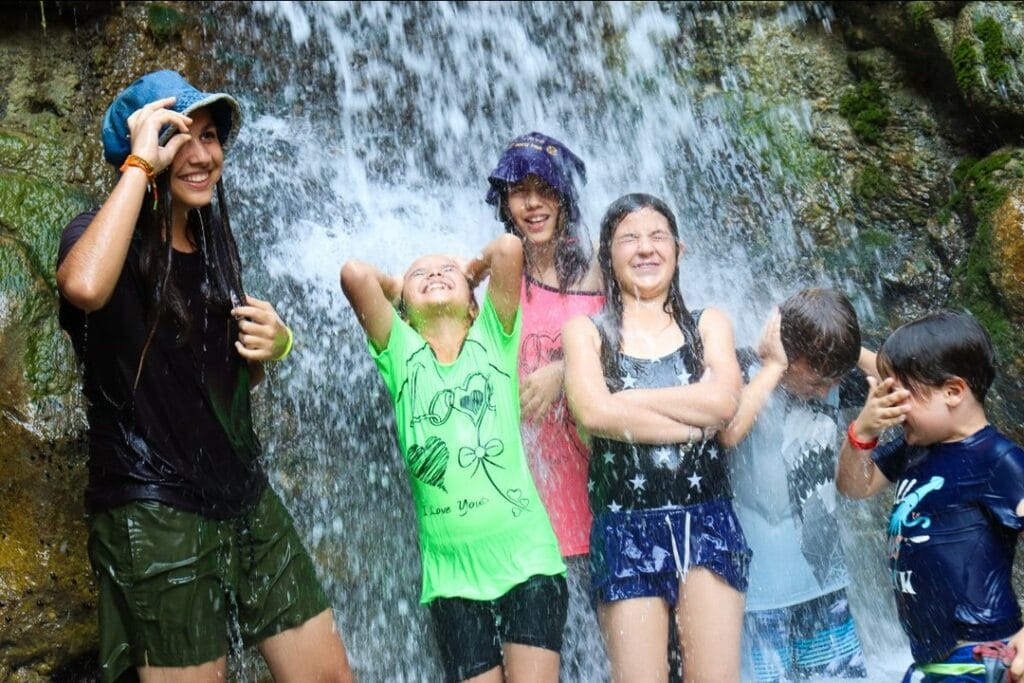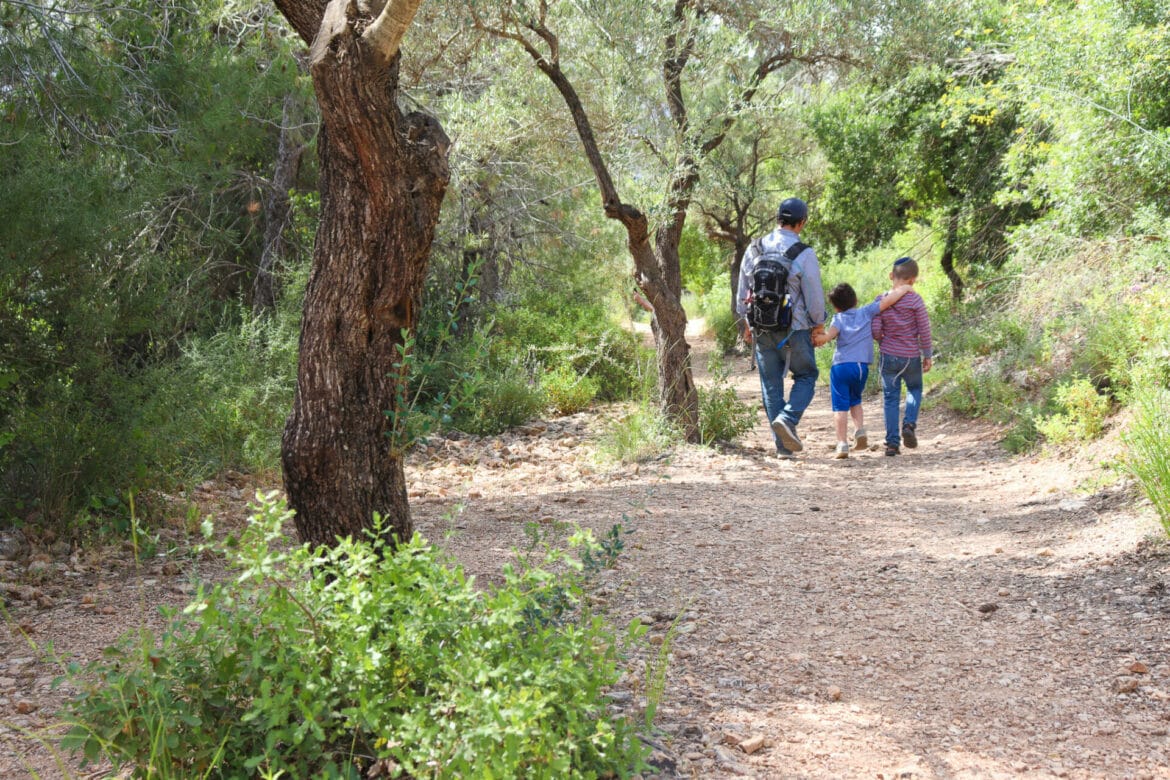
“Ima, can we stop?” “I’m hot!” “This is too hard!” “I’m sooooooo tired! “My legs hurt!”
These are just a few of the complaints we hear from our kids when we go hiking. That’s right… my children complain when we’re out on the trail. And not infrequently.
Most of us want our kids to love hiking. Getting outdoors is an easy, free, enriching way to spend time together as a family. When we’re out on the trail, kids learn about the natural world and the history of our land. They feel the peaceful effects of nature on their general moods. The physical activity of walking and climbing is a benefit too, helping our kids build strength and physical competence.
It makes sense to want to share the gift of the great outdoors with our families. I know I do.
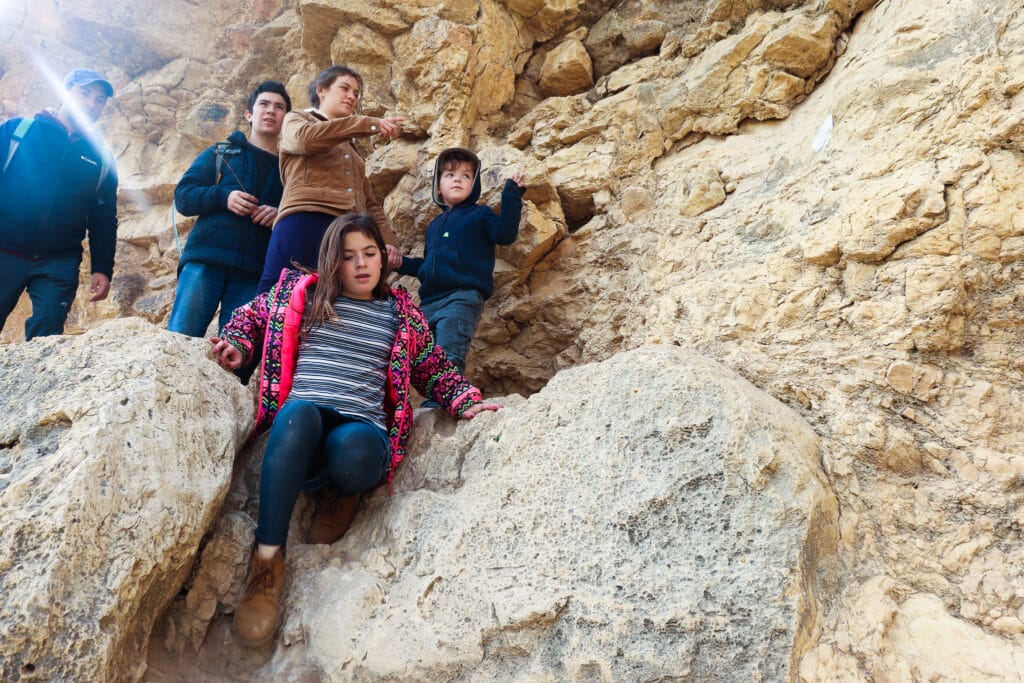
People often want to know if my kids like hiking. And despite the complaining, I have to answer that yes, they do like it. True, they may they whine about the difficulties. They don’t like physical exertion, hunger, thirst, boredom– you know, hard stuff. But at the end of the day, my kids always return home with smiles on their faces, porcupine quill collections in their backpacks, and fond memories of a day well spent. And they almost never balk when I suggest going on another hike.
So, what’s our secret?
There are strategies you can implement to make hiking an enjoyable experience for your kids and teens. After having gone on hundreds of hikes with my family, I’ve learned a trick or two. Here are our tried-and-true methods for helping children enjoy Israel’s great outdoors:
Hiking Time is Quality Time
When I want to take one of my kids on an impromptu special outing, it almost always involves the outdoors. Going on a hike for one-on-one time provides a wonderful opportunity to really communicate with both younger kids and teens.
In the great outdoors there are no distractions. You can tune into one another while your senses are unconsciously engaged in your natural surroundings. In fact, many people find conversation occurs more naturally when walking side by side than when sitting face to face.
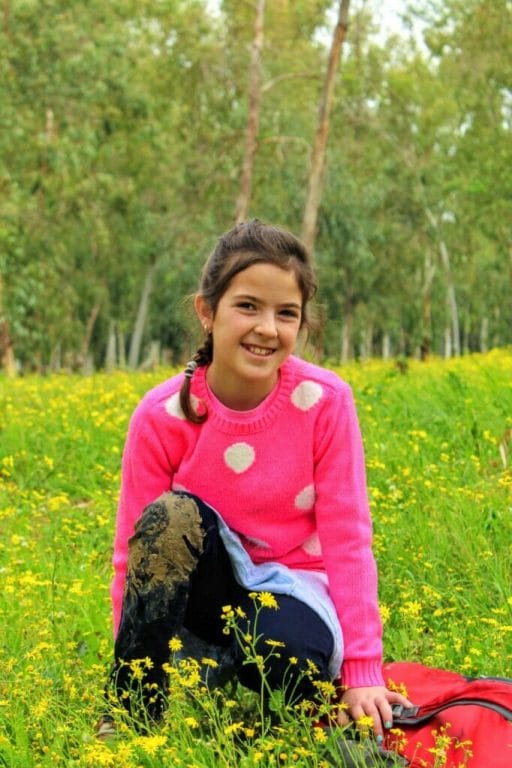
If you make outdoor time special time, your kids will come to treasure it and look forward to hikes together.
Be Prepared
As the adage goes: an ounce of prevention is worth a pound of cure. The first step towards creating enjoyable hiking experiences for your family is to be prepared.
This means choosing, locating, and understanding the trail. When you do this, you can all arrive equipped with everything you’ll need to have a great day. Make sure you know the day’s terrain so you can help your kids choose the right clothing and footwear.

For rainy days, make sure your kids have waterproof boots and a rain jacket. For sunny hikes, bring hats, sunglasses, sunscreen, and extra water. Find out in advance if you’ll need bug spray, water shoes, or long pants. Preparing for a hike properly can create a more pleasant hiking experience for your kids.
As the adult in charge, you should pack bags with food, water, band-aids, flashlights (if you need them), and toilet paper. Make sure to bring the maps, a fully charged cell phone, binoculars, or whatever else can help you have a great day. Don’t expect to be able to find what you need while you are out in nature. The more prepared you can be, the more your kids will enjoy your time outdoors.
Reward Yourselves!
Everything is better with something delicious. A coveted treat it a great way keep kids going on a difficult trail. I know that I eagerly anticipate our mid-hike meal of hot coffee and “healthy” muffins. My kids look forward to their own indulgences on the trail as much as I do.
Try to bring treats that are well-suited to the day and the nature of the trail. My kids particularly love it when I pull out a thermos full of hot chocolate and marshmallows while huddling in a cave on a cold morning. When I go with my teens, we stop at a bakery on our way out to pick up something delicious for later in the day.

Aside from being a great way to encourage your kids to walk a bit more to the perfect spot, picnic time is also a good chance to stop and soak up nature. You can use your lunch break to take a closer look at the earth: the flowers, the rocks, the blades of grass, the insects. This minutia of nature is often overlooked as we move – stopping to sit on the ground will help you and your kids focus in on the details.
Know Your Crowd
You wouldn’t bring a kid to a 3-hour classical concert and expect them to enjoy it. And you shouldn’t bring little kids to an 8-kilometer uphill walk through the woods either. Try to keep your hikes with kids short and interesting. You’ll want to choose trails with plenty of rock climbing, fortresses, tunnels, things to look at, water to splash in, caves to explore, etc, etc, etc.
Teens are more open to long walks through semi-interesting terrain. They’re big enough to appreciate the beauty of a quiet woodland or a gorgeous view. Still, you should consider your teen’s personality and what they would most enjoy before you pick the trail. Many teens love adventurous hikes with hand hold ladders, big jumps into a spring, or tunnel crawling.
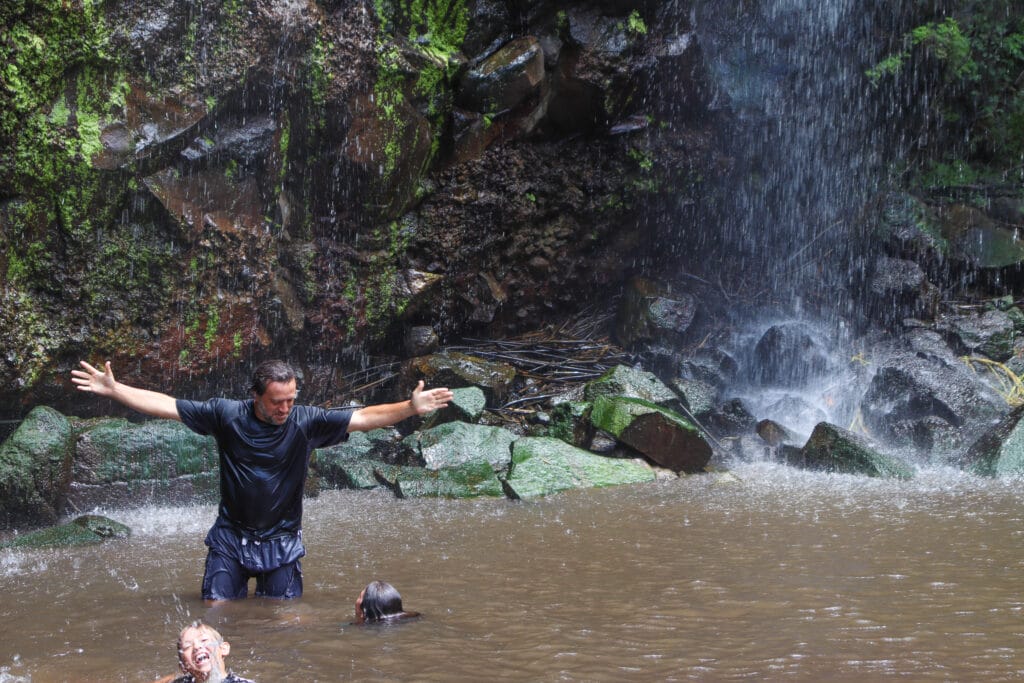
All of this doesn’t mean that you can’t go on a long and hard hike with your family. We’ve hiked 16 kilometer, full-day, tough trails with our small children. But these sorts of outings should be saved for rare and special occasions. And if the hike is long, there must be something incredible waiting for them at the end. (In our case, it was a glacier.)
Don’t Push It
Since we hike a lot, I need to make sure that my kids continue to love it. So, I pretty much follow their lead. If they don’t have a lot of energy and can’t hike anymore, I don’t push them. Of course, I encourage them as much as possible with praise, chatter, treats, or just by showing them the sights.
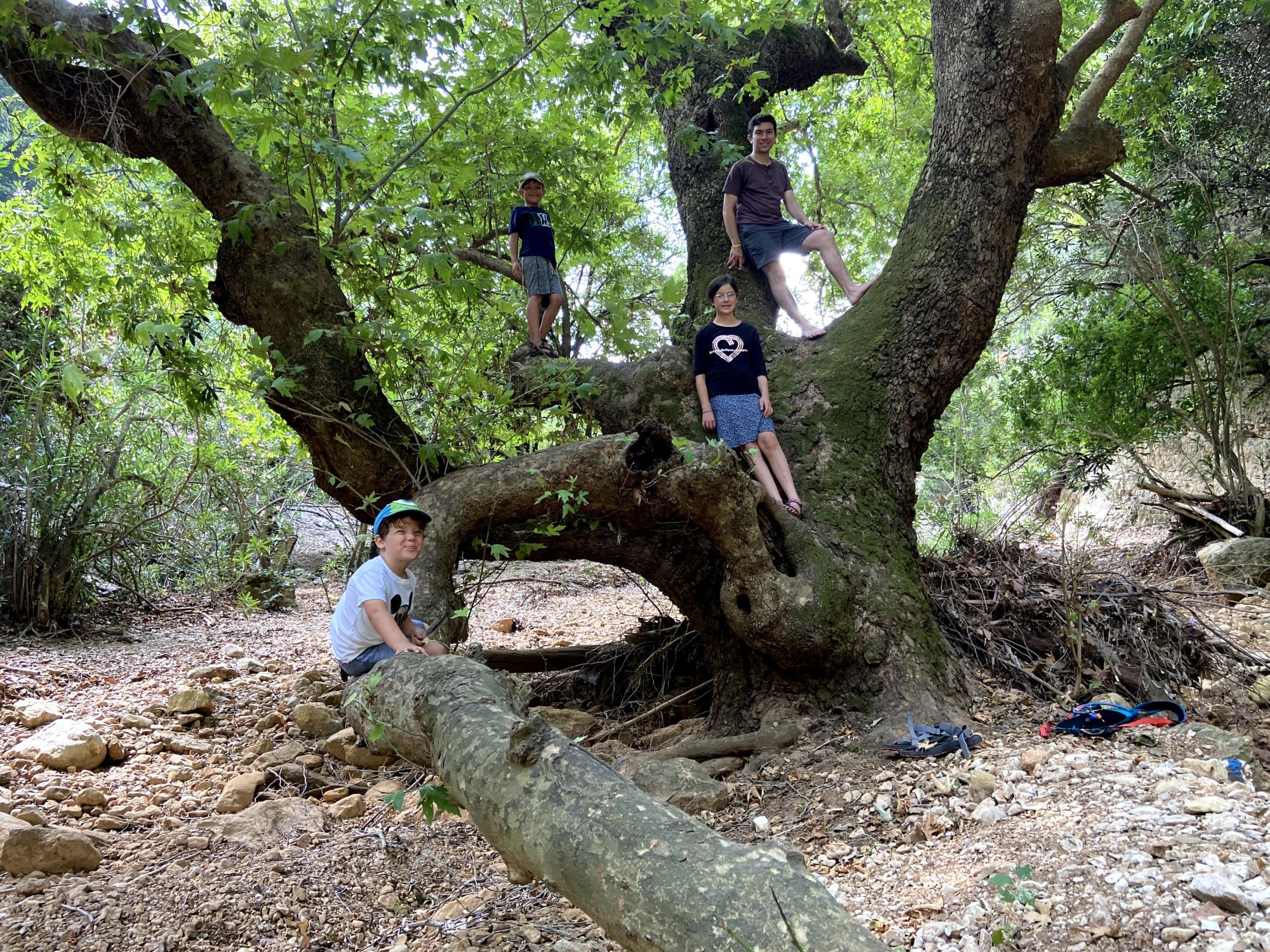
It’s far better to hike 2 fun-filled, enjoyable kilometers than to drag your kids through 7 kilometers when they’re not having fun. Don’t get frustrated that you’ll need hop on the treadmill post-hike just to get in a good day of exercise. Keep your eye on the long-term goal. The more your kids like hiking, the more likely they are to do it in the future.
And remember, they really do have little legs.
But if You Push It, Do It Right
But wait, I hear you wondering….didn’t you just say you hiked 16 kilometers (with a 600 meter ascent) with your kids? Isn’t that pushing it?!
Well, yes, it is. Sometimes, you do have to work hard to see something incredible. In that case, I recommend that you begin by psyching your kids up for the challenge ahead. Let everyone be lazy before the big day as you build up energy. Make sure everyone knows that you are going to accomplish something amazing together.
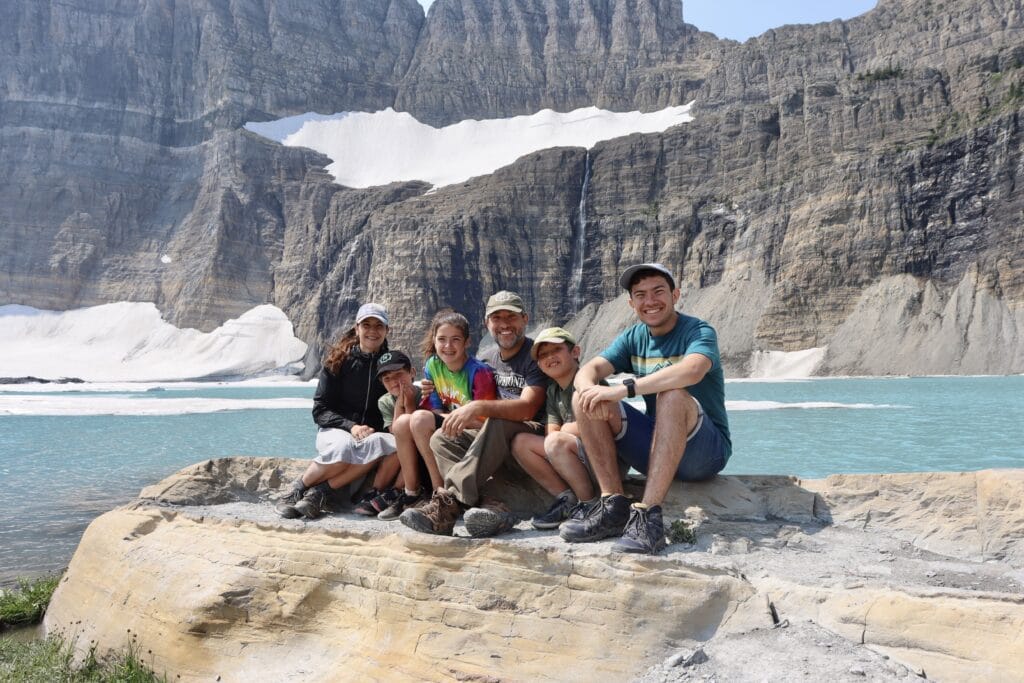
On the day of the hike, bring lots of treats. Once your kids get tired after a few kilometers, let them know that there will be a treat after another kilometer. When you take a cookie break, don’t stop for too long. Make sure your kids know that there will be several short breaks during the day and a big break too.
If your kids have short, manageable goals to work through, they can accomplish something big (ie: complete the hike). Keep offering up positive encouragement along the way. Tell them how amazing they are. And if you need to stop for an extra break, give them a push from behind, or give them a two minute piggy-back ride, just do it.
Point Out the Positive
Always stay positive. This may be the most important part of hiking with children.
When my husband and I hike with our kids, we keep up a running dialogue about how amazing everything is: the birds, the antiquities, the weather (even if it’s raining), the flowers, the trees, and more. We search for interesting rocks and get our kids involved in the process. We pick za’atar, mustard blossoms, and asparagus to eat and encourage our kids to do so as well.
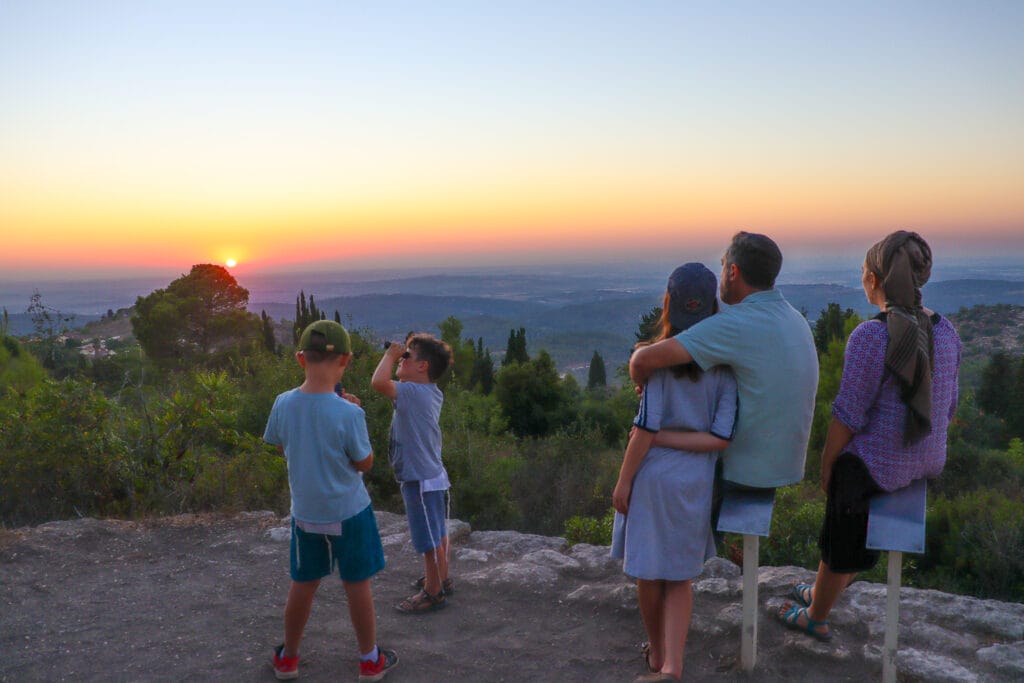
Israel’s nature is incredible. But with a positive attitude it is doubly so. Show your kids how to see the natural world through rose colored glasses.
Help Them
So, here’s the last thing.
Usually, I encourage my kids to be independent. I’m one of those moms who lets my five-year old make his own omelet for lunch. My kids have scavenged, built, and (attempted to) hang wall shelves in their rooms. They know how to cook, clean, and organize. I make my kids do things themselves. I try to help them to develop their own strengths and capabilities. But my tune changes when we go out hiking.
On hiking trips, I don’t expect my kids to be completely independent. If they want a piggy-back ride, I’m happy to offer one. I do try to encourage them to carry their own weight as much as possible. But if they seem to be suffering, I will carry their bag, their water, their jacket, their rock collection, whatever. If one of my kids looks hot and thirsty, I’ll pour water over his head and rub it on his face.
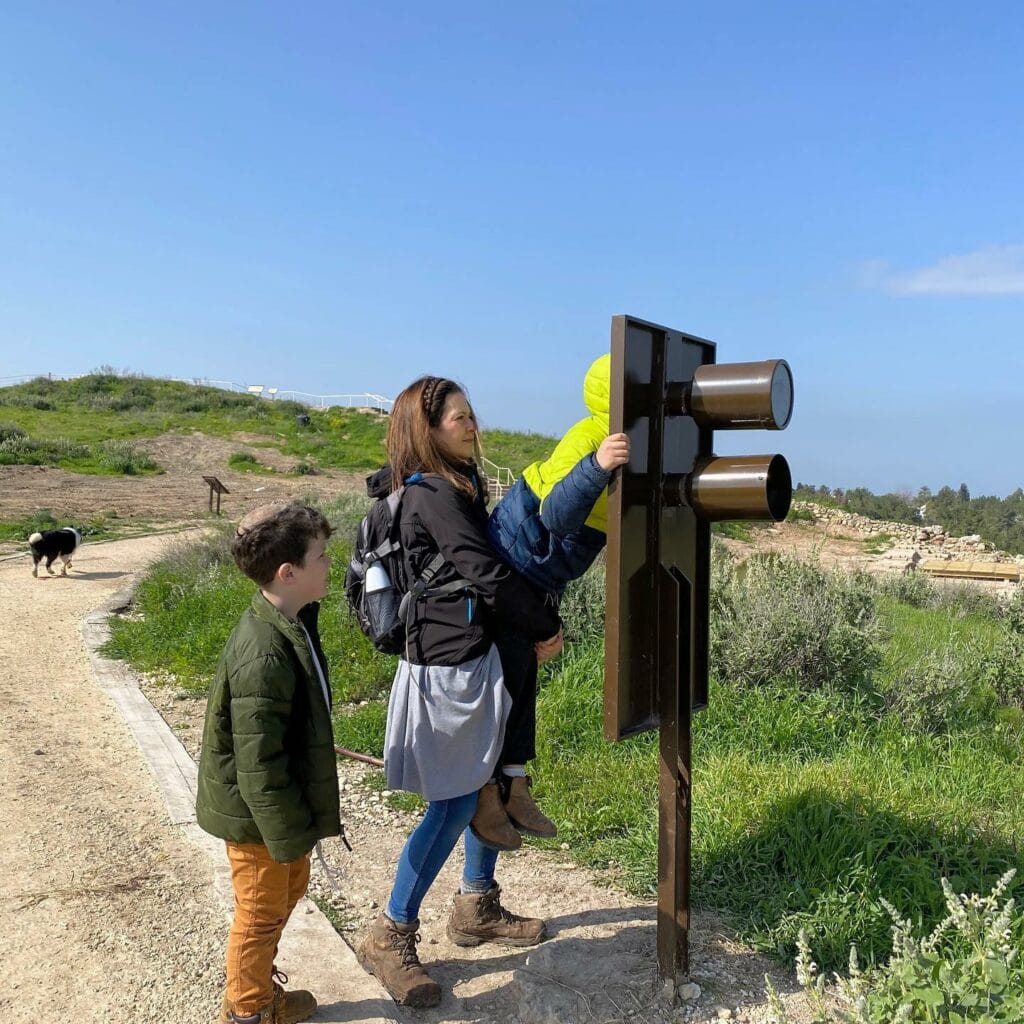
These kinds of caring gestures make the physical challenges of hiking seem less daunting. And eventually, kids do grow out of it. My 21-year-old daughter now carries her own child on her chest, and my 19-year-old son takes multi day hiking trips with a heavy pack of his own.
The inability to deal with physical discomfort does pass. In the meantime, help your kids as much as you can to make hiking an enjoyable experience.
It’s Oh So Rewarding
If you implement these strategies, your kids will come to love and treasure your time together outdoors. Then, you’ll be able to reap the benefits of having a family who appreciates nature. You’ll watch as your kids start to notice and learn about the birds, the flowers, the geology, and the weather. They’ll begin to understand the geography and topography of the land you live in.
Together, you’ll accomplish big physical feats that you never dreamed your kids were capable of. Most importantly, your family will share a mutual interest that you can all enjoy.
Next step: getting them to love cleaning up their rooms.

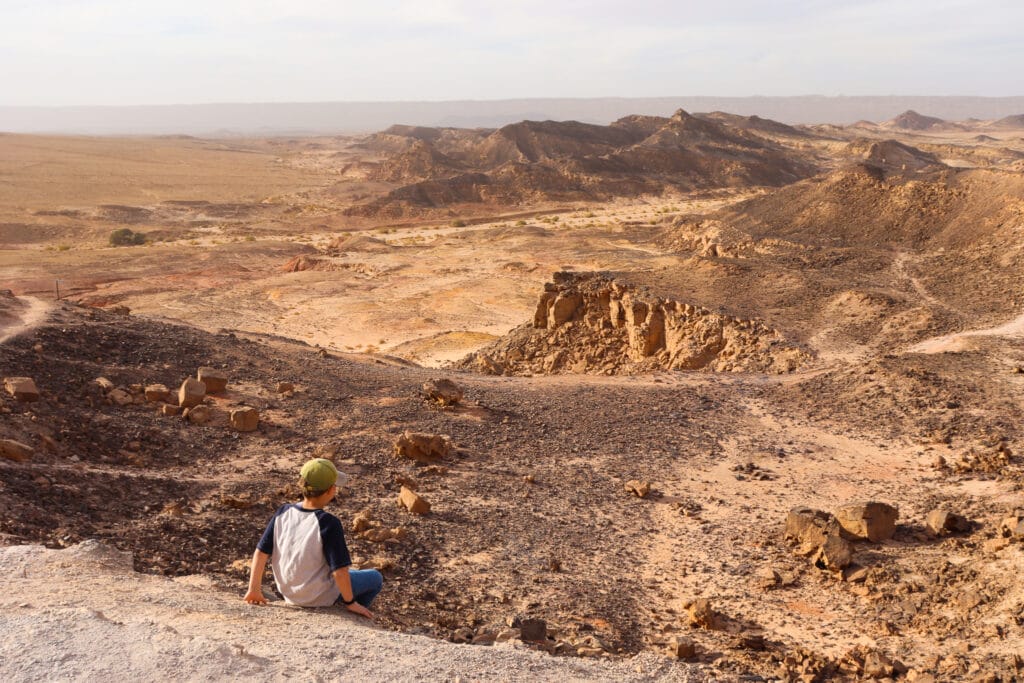
See all of our family friendly trails right here: Kids and Family
